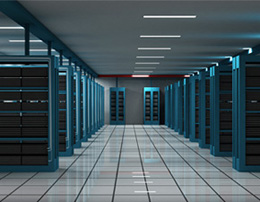A data center is a facility that centralizes a business's IT operations and equipment in addition to where data is stored, managed and disseminated. Data center providers deliver solutions that store a network's most critical systems and are a vital component of a business's daily operations.
Data centers are generally classified as the following:
- Internet-facing
- Supports relatively few applications.
- Typically browser-based.
- Contains many users.
- Enterprise (a.k.a. internal data centers)
- Services fewer users.
- Hosts more applications than internet-facing data centers.
Data center architectures can vary significantly. While data centers built for a cloud service provider satisfy facility, infrastructure, and security requirements, private data centers are dedicated to securing highly classified data.
Elements of a data center:
- Facility
- The location and usable space that is available for IT equipment.
- High emphasis is placed on design to make the most out of the space and to maintain equipment-specific temperature and humidity requirements.
- Support infrastructure
- Equipment that contributes to sustaining the highest level of availability possible.
- Components include the following:
- Uninterruptible power sources (UPS)
- i.e., battery banks, generators.
- Environmental control
- i.e., computer room air conditioners (CRAC), HVAC and exhaust systems.
- Physical security systems
- i.e., video surveillance systems
- Uninterruptible power sources (UPS)
- IT equipment
- Physical equipment that is necessary for IT operations and business data storage.
- i.e., servers, storage hardware, cables, etc.
- Physical equipment that is necessary for IT operations and business data storage.
- Operations staff
- Staff that specializes in monitoring operations and maintaining IT and infrastructure equipment.
The importance of data centers:
- Resiliency
- All data centers have resilient power and air conditioning at a minimum. In addition, bandwidth is truly diversified.
- Access
- Data centers are a central place bandwidth providers connect to. This allows bandwidth services to be diversified and more economical. In addition, accessing hyperscale solutions such as Amazon, Azure and Google Cloud can be more optimal, as it's easy to make connections to their data centers.
- Security
- Businesses are challenged with zero day security threats. Physical security is top notch, from access control to biometrics. Data centers that provide virtual infrastructure or Infrastructure as a Service (IaaS) can be reassured data centers take necessary measures to be more secure. Stratosphere can find the right center for you to meet your compliance or regulatory requirements, including SSAE16, SSAE 18, SOC 1, SOC 2, ISO 270001, HIPAA, HITECH, HITRUST, and/or SOX.
If you'd like to learn more about the value of having a secure data center for your business or enterprise, contact our team today by calling 877-599-3999 or emailing sales@stratospherenetworks.com. We offer expert consultation and management services concerning all IT and IP telephony matters.
Stratosphere Networks Data Center

A safe way to backup critical business information, our secure data centers will protect against losses resulting from hard drive crashes, virus attacks and more.
As your company grows, naturally your data center expands as well, Stratosphere Networks guarantees we can accommodate and expand our services as well. Allowing companies to focus on day-to-day operations rather than communications, our staff will give businesses peace of mind when it comes to IT infrastructure.